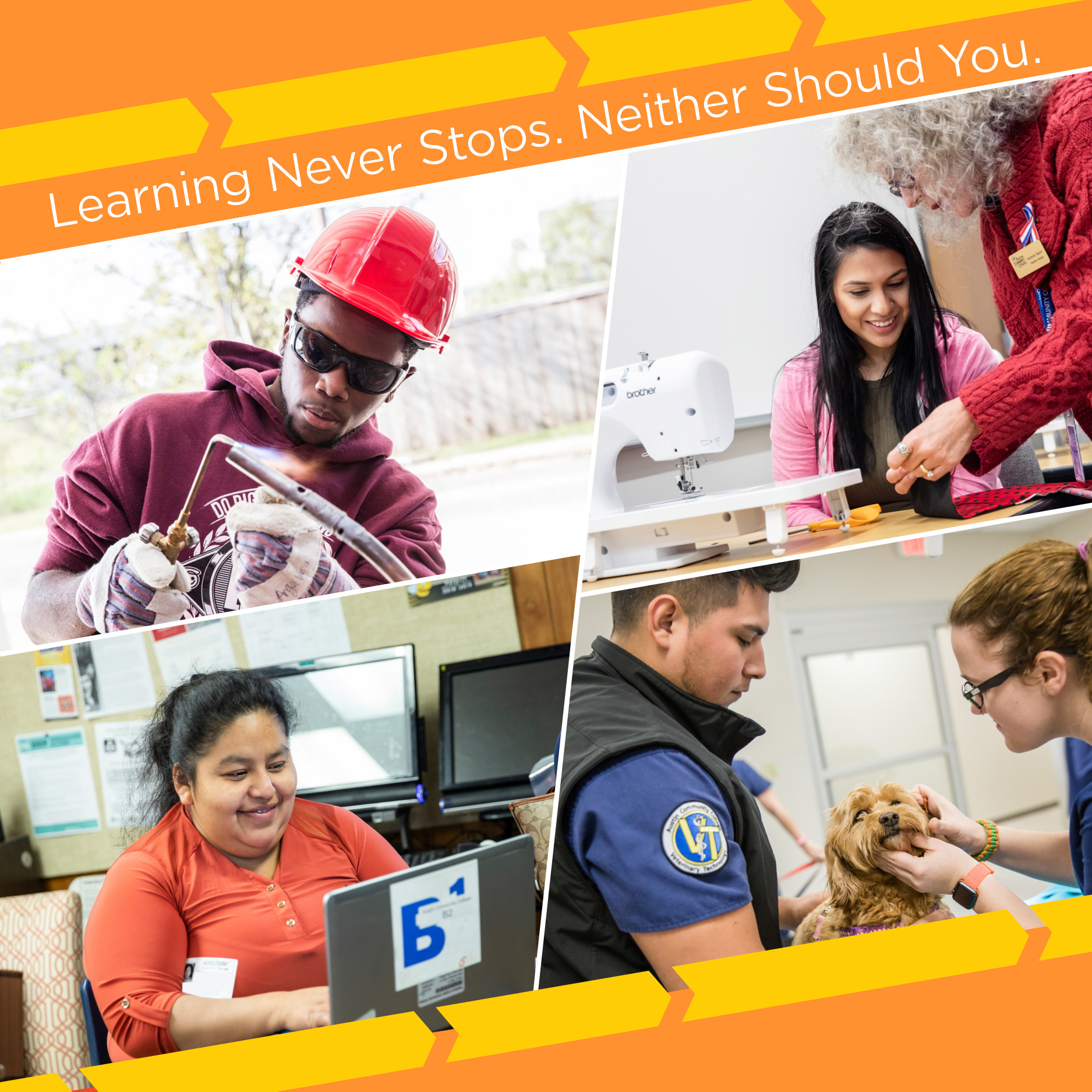CAST A New Future!
Do you work in Manufacturing and need more skills to move up the ladder? Do you just want to learn more about Soldering, 3D Printing, Laser Cutting or CNC Machining? Regardless of your situation, our Core Automation & Semiconductor Training (CAST) program can help you get there.
Would You Like To View Program Courses?
View Course ScheduleAbout The Trainings
Each course runs from a few days to a few weeks and incorporates hands-on learning to help tie theory and best practices together to get you prepared for the next step in the Advanced Manufacturing and Semiconductor Industry.
+ Electronics Series (40 Hours - 3 Courses)
RECOMMENDED: Advanced Manufacturing Production or 6 Months of Technical Experience
- CETT-1001: Basic Electronics (16 hours)
This class covers Electronic Components and Concepts which are critical for operating and troubleshooting many systems. You will learn about: Voltage, Resistance, Current, and Power, Ohm's Law and Power and how they apply to simple circuits, How to use multi-meters and oscilloscopes to measure circuit values, and How to set up circuits with multiple solid-state device. - ELMT-1072: Intermediate Electronics (16 hours)
This class covers complex circuits and alternating current (AC) circuits. You will learn about AC signal properties, analyze series, parallel, and combination AC circuits. - RBTC-1071: Industrial Sensors (8 hours)
Covers industrial sensors and how they are used in automated manufacturing. Common industrial sensors, such as optical sensors, capacitive proximity sensors, and inductive proximity sensors, are reviewed and tested.
+ Automation Series (32 hours - 3 Courses)
PREREQUISITE: Basic and Intermediate Electronics
- MFTG-1071: Fundamentals of Schematics (8 hours)
Students learn to troubleshoot problems using schematics, identify various component symbols, and understand how to evaluate and test circuit diagrams. Basic troubleshooting techniques are covered. - HYDR-1000: Fundamentals of Pneumatics (16 hours)
Students learn about pneumatic components and their uses in industrial applications. In the course, they set up and design circuits using cylinders and directional control valves, and discuss logic, timing, sequencing, and emergency stop functions. - CSIR-1049: Fundamentals of Robotics (8 hours)
Students learn about robotic systems' major components and discuss the various robot configurations and controls that make up a robotic manufacturing system. Various power sources are discussed.
+ Process Control and Troubleshooting Series (48 Hours - 3 Courses)
PREREQUISITE: Basic and Intermediate Electronics
- ELPT-1003: PLC Motor Control (16 hours)
Students learn about programmable logic controllers (PLCs) and their use in industry environments. Basic ladder logic programming, applications, troubleshooting of ladder logic, and interfacing of equipment are covered. - MFGT-1072: Intermediate Schematics (16 hours)
Building on Fundamentals of Schematics, this course teaches students to interpret and use actual tool schematics to troubleshoot and fix problems on more complex subsystems. Schematics in the areas of power, pneumatics, sensors, motors, switches, transformers, and an array of devices that are common to semiconductor equipment are all included. Prerequisites: Fundamentals of Schematics - ELPT-1002: Electromechanical Systems (16 hours)
This course is a study of electromechanical devices found in automated systems. Students gain practical knowledge of pneumatic systems, electric motors, valves, sensors, cylinders, control systems, PLCs, ladder logic and other industrial load and control devices by integrating these subsystems. Troubleshooting electromechanical system failures is also covered
+ Semiconductor Process Series (48 hours - 4 Courses)
- PTAC-1015: Semiconductor Process Overview (16 hours)
This course introduces the process of semiconductor fabrication and its application to the development of transistors. Students learn the basic semiconductor properties, classifications, and operating principles, design, and fabrication of a basic transistor. An overview of industry history and its evolution is included. - SMFT-1070: Advanced Vacuum Technology (16 Hours)
This course covers the physical laws governing vacuum systems. Students review the components of different vacuum systems, including high vacuum systems, tools used to measure vacuum, and basic troubleshooting of vacuum systems. - CSIR-2036: RF and Plasma Processing (8 hours)
Students study the RF system components in plasma-assisted chemical vapor deposition and plasma etching systems. The course reviews important features and characteristics of the plasma process and how to troubleshoot faulty RF systems. - SMFT-1072: Gas Delivery (8 Hours)
This course introduces the gas system components utilized in a semiconductor process tool. The MFC's electrical, mechanical, and thermal characteristics are discussed, and gas panel blueprints and schematics are reviewed. The course provides a hands-on familiarization with, and functional knowledge of, the common components found in semiconductor process gas systems and how to maintain them.
Other Technical Courses
+ Soldering
Take one or all of the classes:
- EECT-1059: Soldering Techniques (7 hours)
Learn how to use an industrial soldering iron. Be able to apply soldering techniques that align with industry workmanship standards. This course is intended for individuals who have little or no prior soldering experience. - EECX-3002: Intermediate Soldering (3.5 hrs)
This short course delves deeper into SMD devices: stacking, wiring traces between them, putting probe wires on, and replacing them. This course is intended for individuals who have soldering experience. Prerequisite: EECT-1059 Soldering Techniques - EECT-1004: Soldering Certification IPC J-STD-001 (32 hours)
This certification program, built around IPC standards, developed and approved by the industry, is delivered by an IPC-certified trainer. Upon successful completion of the training and testing the student is issued an industry-traceable certification in J-STD-001. Prerequisite: EECT-1059 Soldering Techniques
+ 3D Printing
In this 32 hour course, you will learn about the world of additive manufacturing's fundamental concepts such as designing models, various printing materials, and operating 3D printers effectively. Explore the entire printing process from design to finished product, troubleshooting common issues along the way.
Are You Interested In An Above Course?
Contact CoordinatorYour pathway to a successful career!
Wherever you are at in your journey, ACC is here for you. Use the steps below as a guide to embark on a rewarding and successful career. Are you ready to take the next step?





